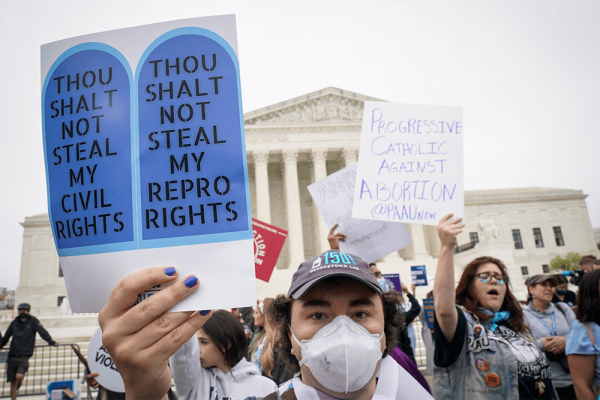On the evening of May 2, Politico reported on a leaked draft of a Supreme Court decision in Dobbs v. Jackson which, if it became official, would overturn Roe v. Wade and end federal protections of abortion rights.
The draft, which was confirmed as authentic on May 3 by Chief Justice John Roberts, is not an official decision. Roberts wrote that the document “does not represent a decision by the Court or the final position of any member on the issues in the case.” He also announced an investigation into the source of the leak.
The drafted opinion was written by Justice Samuel Alito and he was joined by four justices — Clarence Thomas, Neil Gorsuch, Brett Kavanaugh, and Amy Coney Barrett — according to Politico. In the opinion, Alito writes that “Roe was egregiously wrong from the start. Its reasoning was exceptionally weak, and the decision has had damaging consequences.”
The overturn of Roe, which would allow individual states to determine the legality of abortion, has been a political project of the Religious Right since the late 1970s. While abortions are currently still legal, 13 states have “trigger-laws” which would outlaw abortion if the court overturns Roe, and some estimates suggest about half of states would quickly outlaw abortions.
Many progressive faith leaders lamented the news that the court seemed poised to overturn Roe, and highlighted how their faith contributed to their pro-choice work.
Rev. Katey Zeh, who leads the Religious Coalition for Reproductive Choice, told Sojourners in an email that it is essential “people of faith take the lead from the reproductive justice leaders and organizations, like abortion funds, in their local communities that have been preparing for this moment for decades.”
“Regardless of what the Supreme Court decides, I have no doubt that people of faith will continue to live into the sacred call of journeying alongside those making reproductive decisions, whether that’s continuing a pregnancy, ending a pregnancy, choosing to parent, or choosing not to parent,” Zeh wrote in the email. “We each must discern what particular role we can uniquely offer as people of faith, whether that’s providing practical support like funding and transportation assistance, offering spiritual fortification and healing to patients and providers, or using our voice in the public square to advocate for reproductive freedom because of our faith, not in spite of it.”
Candice Marie Benbow, author of Red Lip Theology, told Sojourners that the overturn of Roe would be “catastrophic” and that she hoped people of faith would “strategize to ensure those left most vulnerable will have what they need to thrive and make the best decisions for their lives.”
Some moderate faith leaders wrote that they hoped to see better support for people with unplanned pregnancies. Justin Giboney, president of the AND Campaign, wrote on Twitter that Democrats have been “reckless” in supporting “some of the most extreme abortion laws in the world.”
“However, if the conservative position is actually rooted in compassion, they’ll act on healthcare, paid family leave and childcare post-Roe,” he wrote.
Rev. Rob Schenck, president of The Dietrich Bonhoeffer Institute and author of Costly Grace: An Evangelical Minister's Rediscovery of Faith, Hope, and Love, told Sojourners in an email that the overturn of Roe would be a “[m]ajor setback to the gospel of grace and love.”
“I’d like to think that the hundreds of millions of dollars, countless human hours, and, of course, incalculable number of prayers that went into ending Roe v. Wade might be redirected toward helping women, children, and families in crisis, so that the babies born as a result [of overturning Roe] and their families will be supported in every way,” Schenck wrote. “Reality tells me that won’t happen because conflict-driven causes have made many individuals wealthy and politically powerful.”
A number of conservative Christian leaders expressed hope that the leak would be the final decision. Brent Leatherwood, acting president of the Southern Baptist Convention’s Ethics & Religious Liberty Commission, told Christianity Today that the leak was “a breathtaking development.”
“Assuming it truly remains a majority opinion—which could still change—it means we are one step closer to ending the Roe-Casey abortion framework that has stalked this nation for nearly 50 years. It feels almost like a dream to be able to state that,” Leatherwood told Christianity Today.
Several faith leaders pointed to the connection of abortion restrictions and racism, poverty, and voting rights.
“There’s nothing pro-life or pro-family about the movement that harnessed white rage to elect ‘traditional values’ candidates who consistently vote against living wages, access to healthcare, affordable housing, public education, immigrants & plans to address the climate crisis,” wrote Jonathan Wilson-Hartgrove, a pastor and community activist, in a tweet.
“Abortion is banned in my native Guatemala, so wealthy women fly to the US or Mexico to get safe abortions in a medical setting,” Karen González, author of The God Who Sees: Immigrants, the Bible, and the Journey to Belong and immigrant advocate, wrote in a tweet. “It’s the poorest, most under resourced women who suffer the consequences of back alley abortions or of having children they cannot afford or care for.”
Rev. Kelly Brown Douglas, dean of Episcopal Divinity School at Union Theological Seminary, wrote on Twitter that overturning Roe “is an attack on women’s freedom and right to choose.”
“Poor women – and especially poor women of color – would once again shoulder the burden of this decision, and they would have their choices limited and freedoms taken away,” Douglas wrote.
Jamie Manson, president of Catholics for Choice, said in a statement sent to Sojourners that if the leaked decision became official it would be an “affront to our nation’s judicial process and devastating to the people whose lives are jeopardized by the court’s actions.”
She also referenced statistics that find nearly a quarter of people who obtain an abortion are Catholic.
“Abortion is a part of the life of the church, and God loves anyone who has chosen to have an abortion,” Manson wrote in her statement. “The time is now for the silent majority of pro-choice Catholics and former Catholics to be outspoken and emboldened in their support for abortion access for those who choose it.”
Elaina Ramsey, the executive director for Faith Choice Ohio, told Sojourners in an email that her faith inspires her to build a world “where there is no reproductive oppression, coercion, or forced birth in the name of God.”
“We at Faith Choice Ohio will continue to stand in the gap by providing pastoral & practical support to abortion seekers and by training congregations & faith communities to boldly advocate for abortion access — including self-managed abortion through medication — without apology,” Ramsey wrote.
Got something to say about what you're reading? We value your feedback!





